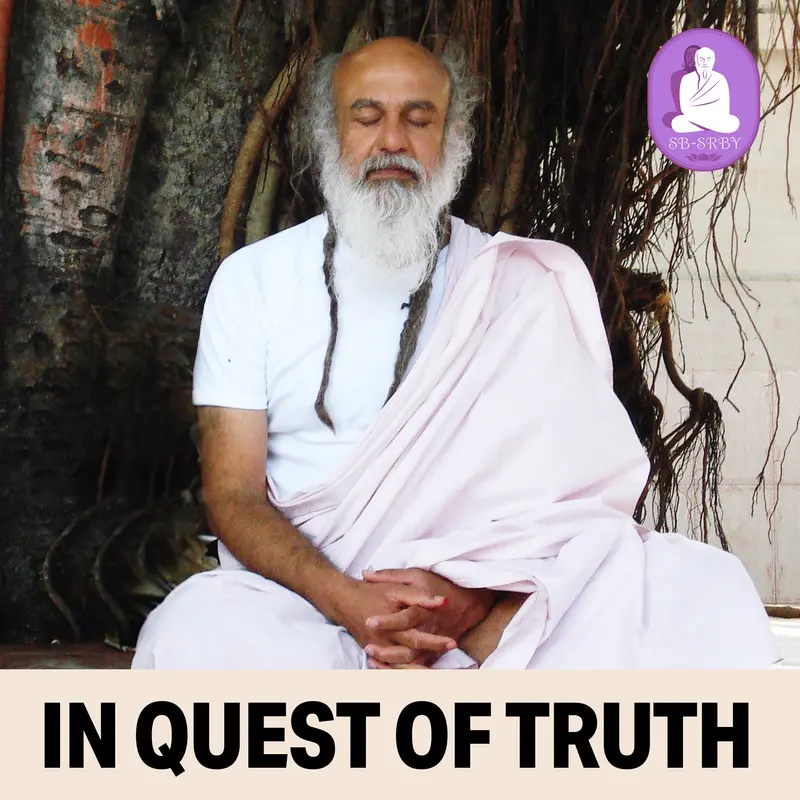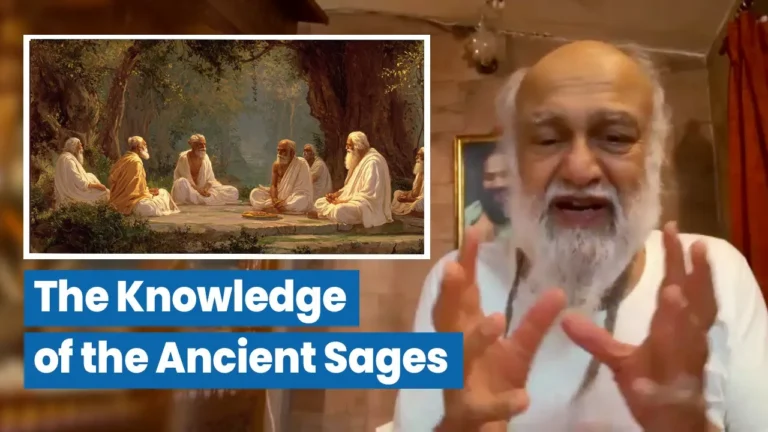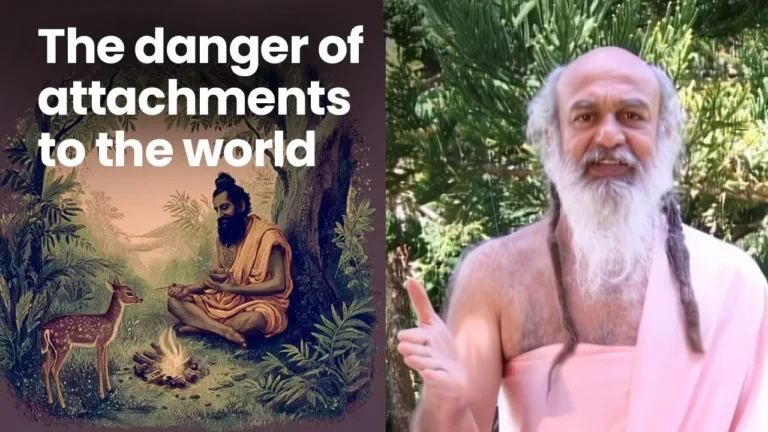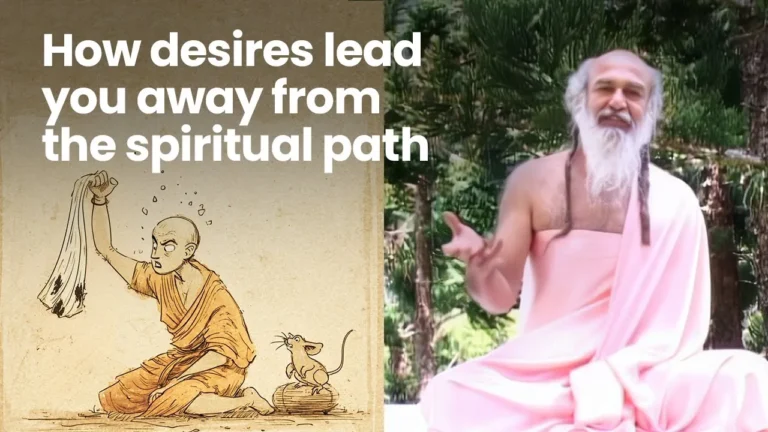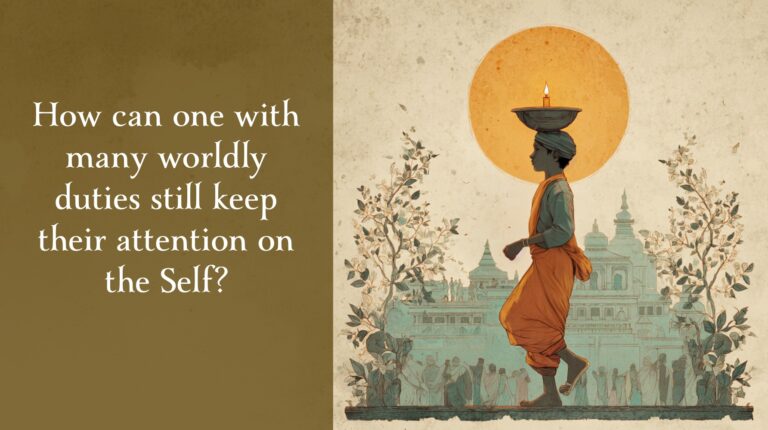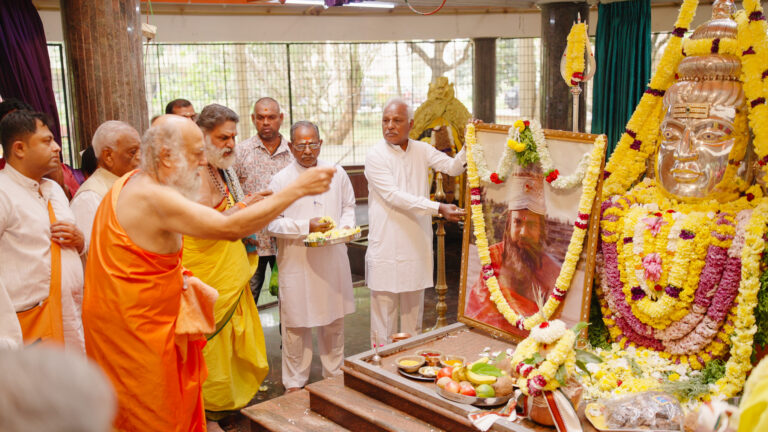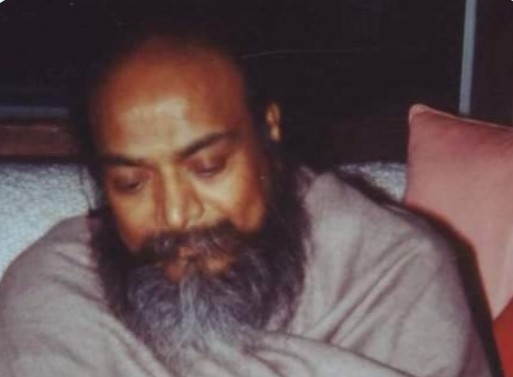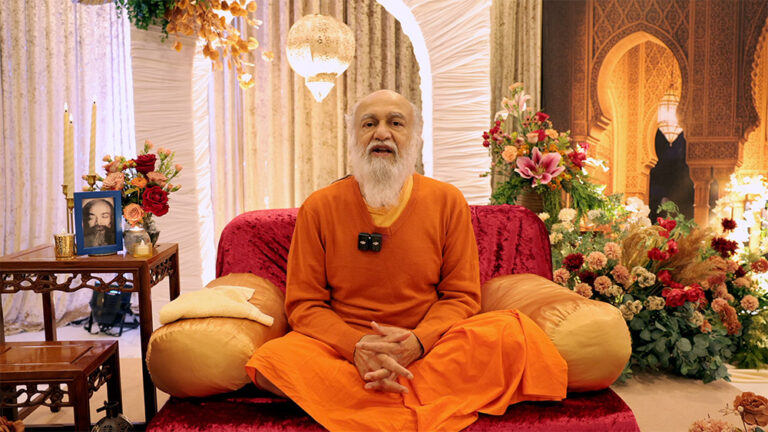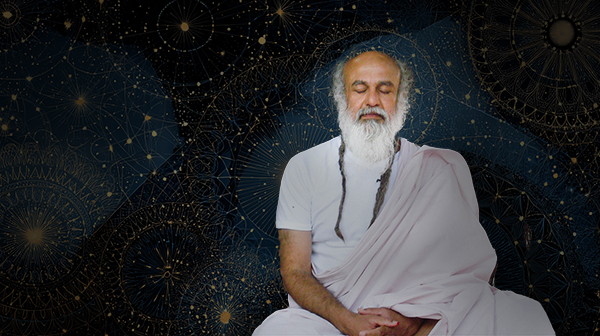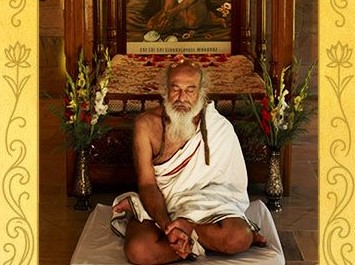October 2005 – Sunshine Coast Day 3
Brahmanandam Paramasukadam
Kevalam Jnanamurtim
Dvandvaateetam Gaganasadrisham
Tattvamasyadi Lakshiyam
Ekam Nityam Vimalam Achalam
Sarvadhi Sakshi Bhutam
Bhava Teetam Triguna Rahitam
Sadgurum Tvam Namami
Prostrations at the Lotus Feet of my beloved Guru Shivabalayogi. I greet you all with my love and blessings. May you all be the luckiest souls to genuinely attain that Supreme Truth.
Over the last 2 or 3 days we have discussed meditation, reverence and practice. Practice of this meditation will give you that desired contentment; you will become elevated closer to God, who is within you. After you practice this for some time – a few days or weeks – do not think, “It is not coming. It is not possible.”
In the Bhagavad Gita, Arjuna says to Krishna, “Krishna you speak so easily of catching the mind; but the mind is so slippery. Catching it is the most difficult thing to do.” Shri Krishna replies, “Yes. The mind is fickle and won’t stay in one place. BUT practice will bring it under control. It is by practice that you can control the mind which is so slippery, Arjuna.”
It will come, simply because the mind is yours. It is your own. This mind has developed its own world, based on its own imaginations – then it has developed cravings. It gets thousands of thoughts one after another. If you watch carefully, sometimes you will observe your mind will imagine something nice about yourself and be happy. Then suddenly the mind goes out of control – “Will this happen? When? How?” The mind peculiarly experiences unhappiness so it can be happy.
We want love, care from others. Swamiji used to say, “Why do you want this from others? First fix your own problems, and try to give this to others. Then you will see God helping you and loving you everywhere.”
This mind has been out of control since time immemorial. Krishna tells in the Bhagavad Gita, “Tyaga shanti anathanam.” – You attain Peace only when the mind sacrifices its unhappy thoughts. This is simple, but deep. Many times people have asked, “What needs to be sacrificed?” The answer is that it is the mind’s worries, troubles that need to be sacrificed – then the mind becomes quiet.
But the mind is habitually bothering and worrying. It tries to take the whole universe on its head. It broods over the past – “It was so nice when I was a child.” It worries about the future – “Will I be happy?” You will be happy if you can keep the mind quiet – not if you become a millionaire, if you have ten cars, and so on. If you can simply keep the mind quiet, then this will give you permanent happiness.
I spoke earlier about reverence to the Guru. To show this reverence, we use certain rituals – they are not superstitions. For instance, if flowers are available, then offer them to Guru and God. If light is available, then perform aarati. But if these are not available, God is not worried. God is not unhappy if these things are not done. God is unhappy if your heart is not pure.
Heart and mind are both your consciousness. Mind is your intelligence. Heart is your emotions – this can be your strength or your weakness. If you are emotional by nature, then love God, love the Guru – from the depth of your heart. Then the mind will settle also. If you have this love then the mind will accept the need to do one hour of meditation, rather than trying to get out of it.
In talking about sacrifice, there is a story at the end of the Mahabharata. In this story Yudhishthira performed a sacrifice in which a particular horse was worshipped then it is released to roam freely and the king’s army followed it. If they entered a kingdom then the king there had to either capture the horse and fight the army, or had to surrender. After the homam for this sacrifice – the fire ceremony – it is the custom to present gifts to the worthy people there. Now at this homam, one beaver came and his coat was half golden. He came and rolled around in some of the leftover things from the homam gifts. After doing this he came to Yudhishthira and spoke to him, “Don’t become too egotistical about this homam as I don’t see this as a great sacrifice. I have seen greater.”
Yudhishthira asked, “Why do you say that?”
The beaver replied, “What you have given away – all these gifts, all this wealth – is not yours. It is from the efforts of others. I went to a previous sacrifice at which when I rolled around in the gifts, I picked up this golden color from the gifts, and that is why my coat is now half golden. Here when I rolled around in these, I am not getting any more golden than I previously was.”
So Yudhishthira asked the beaver, “What did you see in ancient times at this sacrifice that made it so great?”
The beaver said, “There was a village in which there was a severe earthquake. In that village, after the earthquake there was a man and his family who were left with very little but they gave what they could to the rest of the village. They gave away everything of theirs until in the end only a small amount of flour was left. With this flour they made some rotis (flat bread). Now God came to this family in the form of a beggar and asked for some food and the starving man gave his food to the beggar. Then God came as a famished dog to the family, so the man apologized to the dog as he had already given his food to the beggar and told the dog, “Please wait. I’ll ask my wife and children.”
The children offered, “Father take our food and give it to the dog, then you and mother can share yours.”
Then the mother offered, “No, take mine. Then you and the children can share the rest.”
Hearing this the man of the house started crying, so the beggar asked him, “Why are you crying?”
He replied, “I’m crying because they are still fortunate to be able to offer their food to this dog. I have no food left, so if he can use it, I would ask him to please use any part of my body.”
The beaver went on with his story. “When I came at this time to this glorious family, I then rolled in some of the flour which had sprinkled on the floor. It covered half my body and that half miraculously became golden. Since then I have been searching for another sacrifice of equal greatness to this one, but have not been able to find one.”
Yudhishthira was amazed at the story of the family’s wonderful sacrifice.
In this present day it is difficult to appreciate this. You see the guest is equal to God in Indian philosophy. This sacrifice story always inspired me to sacrifice for others.
Food is made sacred when it is touched by a Yogi. It becomes blessed food; and this blessed food if eaten, will help to elevate your mind. So take this Prasad as purified food, as sacred.
Adi Shankaracharya spread the teaching of ‘advaita’ – only one single self exists. A contemporary of Shankaracharya was Ramanujarcharya. He taught, “We are a spark of the Divine only.” At the same time the school of philosophy connected to Madhvacharya expressing devotion taught, “That individual ‘jivatma‘ is separate from God.” These three are not different – there is no disunity. In the beginning, you see yourself as God’s devotee. At the next stage you experience you are part of God – like a ray from the Sun or a droplet from the ocean. Finally in Nirvikalpa Samadhi, only one single Self exists; the ancient sages used the term ‘Tat‘ which means ‘That’.
Respect for the Guru and the teachings is important in all the stories of India. In one story, Ramunarcharya was initiated by his Guru into the recitation of a particular mantra.

The Guru told him, “This mantra is very sacred – don’t tell it to anyone. If you do this and recite it with faith, you will reach heaven; but if you disrespect this mantra then you will go to hell.” Now the student was only a young boy, but he went to the top of the temple and called out to everyone, “Om Namo Narayanaya” which was the mantra his Guru had given him. His Guru was furious. But the boy replied, “If all these people can have Liberation, then if I go to hell it is no problem.” Hearing this from the boy, his Guru was pleased with his attitude of sacrifice and blessed him.
Normally the Guru tells the student not to reveal the practice to anyone because then it is considered valuable by the student. So Krishna tells Arjuna, “This is the most secret knowledge. I am giving it to you because you are dearest to Me.” So this is why initiation is given this way – to make the student value it.
We have spoken of some great examples of sacrifice. Our great Gurus taught this. Swamiji Himself used to say, “When you live for yourself, that is Life. When you live for others, that is Mission.” Ultimately what is important to sacrifice is the mind’s ego. If you meditate regularly then these noble qualities automatically come to one.
Swamiji didn’t like to be called a ‘religious teacher’ as religion is often used for selfish purposes. Ultimately religion comes down to looking after one’s physical health, mental health and morality. The physical health is influenced by the types of food one eats, fasting, physical exercise – so the body can be healthy and therefore we can be happy. Yet the body may become ill even though we are trying to keep it healthy.
Then using this physical body we can perform exercises for mind control – like chanting mantras, prayer, meditation. All these are to control the mind. Swamiji said all religions are good; only human weakness makes us condemn others’ beliefs. So control the mind and it becomes purified; it loses all its imaginations. It loses greed, anger and so on. Thus a Yogi is able to love everyone as He sees the Self in everyone. Some people may come and go, some may stay for some time – but the Yogi blesses all of them. Swamiji would say, “To become a Saint, one has to become like a mother.”
The third aspect of religion is moralities. This is basically considering about others. This becomes possible only when the mind is controlled – then one thinks of everyone. So the ancient sages prayed, “Let all the worlds and all creatures be happy and at peace.” When you pray for everyone, then automatically you are included in that. This is the basis of moral values – let me love and care for others, as I want to be cared for. This comes about as the mind becomes refined. My Guru said you have to practice, practice and practice. It is like cleaning a cloth repeatedly – you clean it, then when you use it then it gets a little dirty again, so again you clean it, and so on. Gradually it will get clean despite being used a little. So when youngsters ask, “What is the use of religion?” then we can give these reasons. No founder of a religion made it available for only one group; the ancient sages simply taught, “Use these methods to control the mind.”
Swamiji used to say, “You are the best judge and critic of your own mind. Is it settled? Is it nobler after doing this meditation for some time? If so, then it is worthwhile.” Thus Shri Krishna says, “Those who are on the true path of spirituality, God will automatically protect.”
Practice. Then these things will be yours. Remember the mantra, “Though it is difficult, it is not impossible.” Remember this always, then meditation is very easy. Look for me always in your heart, at the Lotus Feet of my Guru.
Questions and Answers
Question:
Does being in Samadhi correspond with a totally breathless state?
Babaji:
There will be minimal breathing; if there is no breathing, then the body will perish. These things like changes in breathing occur automatically; if you focus the mind then the breathing energy becomes channelized. Also when one is in deep Samadhi, when one comes back to the waking state, then it is good to take a little water. Going into Samadhi is one skill, then coming back to the level of the brain is a different skill. Then taking water makes this a gentler transition.
Question:
Can You please speak about love for Guru? Is it a total love, where by comparison the love for husband or wife is less?
Babaji:
No. As your awareness gets elevated, then you see God in the wife or husband. If such a love is natural, if it comes from the depth of the heart then it is not an obstacle.
Question:
Could You please speak about the Guru-disciple relationship? You said in Your talk not to expect love from others. How does that fit into the Guru-disciple relationship?
Babaji:
What I meant was that one should gradually reduce one’s attachment to material things and focus within. Swamiji taught me to look for Him within. Don’t look for reward in this world. For instance you should not think the Guru’s love is only for you. Know it needs to be shared over the whole world.
So one should not expect a material reward. It is just the same as when a Mother is away from her child, still the child knows they are loved by the Mother.
Question:
Why is it important for You to love everyone?
Babaji:
It makes them happy. Everyone wants love and care – it gives one an anchor in this life.
Question:
Shouldn’t they instead become self-contained?
Babaji:
At Self Realization they will achieve that, but until then, they need an anchor.
Question:
But isn’t the true anchor within?
Babaji:
The Divine is within and without. If someone wants my Love, it’s there for them.
If they don’t require it, then that’s fine.
Question:
Does Self Realization happen quickly or gradually?
Babaji:
It depends on the mind’s receding; whether that is quick or gradual. The mind takes time to give up its attachments. In Realization, the mind is in the Self, and remains there in all circumstances.
Question:
Can that happen without meditation?
Babaji:
Whatever draws the mind’s attention will keep it out in the world. To go to the Self, it has to recede.
Question:
If it’s quick does that mean the soul is advanced?
Babaji:
In such a case it occurs because the soul is ripe. So in Shri Rama’s case, the legend says that sage Vasistha spoke to Him for 7 days and at the end of the7 days, Rama attained Nirvikalpa Samadhi. This was because Rama’s soul was so ripe.
It is like wood which is dry catches alight so easily. If the wood is wet then it needs to be prepared, and then it can make a fire.
Question:
Is it possible for you to grow when you have negative energy around you?
Babaji:
If there is negative energy around you then detach the mind from it and focus it on God. The mind needs to be strong enough to be able to do this.
Question:
In some other systems there are many techniques employed. In this technique one seems to simply get deeper and deeper. Where do things such as kundalini fit into this system?
Babaji:
With this technique, it is enough in itself. With regard to kundalini one needs to understand what kundalini is. Kundalini is that portion of the consciousness which has gone into the body to give body consciousness. Compared to the mind, the mind consciousness is more powerful, but it is more spread out. When one focuses the mind then it will draw the kundalini. If one works only on kundalini then the mind is not controlling it and it will tend to drop back and one will experience a lot of greed and lust and so on. If one can learn to concentrate the mind, then all the rest follows automatically.
Question:
Are there different levels of Realization? Some people exhibit what appear to be ‘tricks’.
Babaji:
Realization alone is Realization. But on the way, powers may come. For me, ‘Miracle’ means one gives Peace to this world. If you don’t know the technology of a thing, then it seems amazing. A hundred years ago, flying was just a dream. Now it is commonplace – for a few thousand dollars you can fly anywhere in this world like Hanuman. This now seems commonplace because the technology is understood now.
Our job is to inspire people – not to attract people.
Showing these ‘tricks’ is like giving a lollipop to get people to go to the school. But some people get stuck to the lollipop and don’t go to school.
Question:
Baba, I am looking for an overview of the growing world population and the people who are starving in this world. The level of opulence I enjoy is not possible for everyone in this world. There is not enough for all to have this. This leads to war amongst us. It all looks chaotic. How can one get a sense of purpose?
Babaji:
If we practice meditation we can restrain ourselves; otherwise it is difficult to decide what is best. Scientists say there is enough in this world for our need, but not our greed. The population is controlled by birth and death which are natural. Also there are natural disasters. But what is concerning is our behavior to each other. Swamiji said, “First become perfect human beings. Then you can become gods and angels later.”
© 2005 SRBY, All rights reserved.

